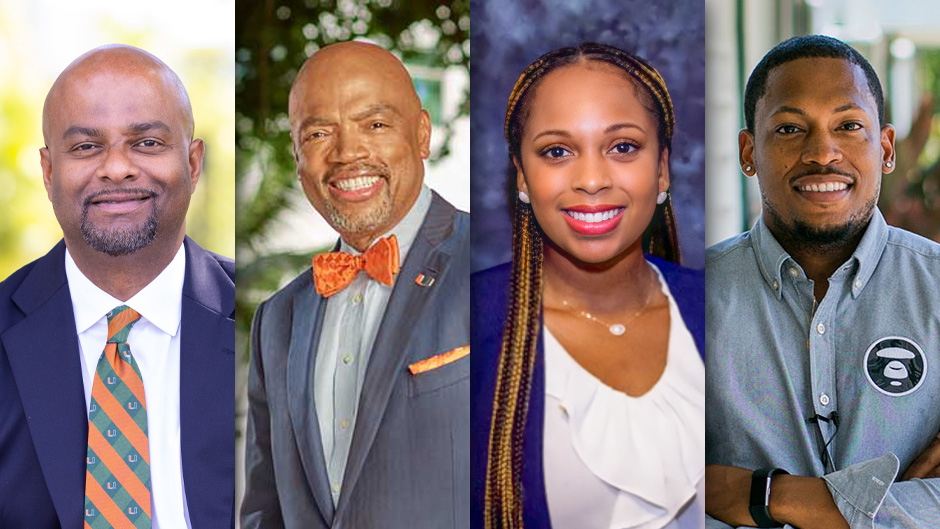Hosted by the Human Resources’ Office of Workplace Equity and Inclusion, in recognition of Black History Month, leaders from the University of Miami will gather for a virtual, candid panel discussion, “Leadership Insights: The Future of Work.” With diverse backgrounds, including a range of career paths and experience, the panelists will share the pivotal happenings and decisions that shaped their careers and personal growth.
Attendees will gain practical advice on career development, preparing for change, embracing the increasingly complex workplace, and acquiring the skills to stay relevant and achieve success.
Friday, Feb. 24, 10:30 a.m.–12 p.m.
Register for Leaderhip Insights: The Future of Work.
Learn more about the event and meet the moderator and panelists:
Richard Sobaram, assistant vice president for Student Affairs—Housing Strategic Initiatives, University of Miami
As the assistant vice president for housing strategic initiatives, Sobaram has a key leadership role in executing the remaining phases of the Housing Facilities Strategic Plan on time and on budget. He serves on the Division of Student Affairs executive leadership team, where he pays special attention to strengthening the University’s business practices, contingency planning, and facility management. In doing so, Sobaram relies on his extensive network to continue strengthening partnerships with the divisions of Facilities Operations and Planning, Business and Finance, and Enrollment Management, among others. Additionally, he provides guidance and oversight to the Department of Housing and Residential Life’s functional areas of facilities and operations, residential life, and budget and personnel.
Dr. Henri R. Ford, dean and chief academic officer, University of Miami Leonard M. Miller School of Medicine
A Haitian-born pediatric surgeon, Ford is recognized for his global contributions in medicine including performing the first successful separation of conjoined twins in Haiti in 2015, alongside surgeons he helped train..
Motivated by a desire to drive change and have a positive impact on the world, Ford has conducted groundbreaking research on the pathogenesis of necrotizing enterocolitis (inflammation of the intestine) and has been funded by the NIH and the RWJ Foundation, among others. He is the author of multiple publications, book chapters, invited manuscripts, abstracts, and presentations. Learn more about the dean.
Tamra Lopez, director of satellite practice at Plantation, University of Miami Hospitals and Clinics, Sylvester Comprehensive Center/Bascom Palmer Eye Institute
Born in Brooklyn, New York, Lopez grew up in Fort Lauderdale and was raised in a Caribbean household, by a Jamaican mother and Dominican father, where she was immersed in the cultural salad bowl of South Florida. She earned her Bachelor of Health Services from Florida Atlantic University and her Master of Business Administration in Health Administration from Florida International University.
As the director of satellite operations at the University of Miami Sylvester Comprehensive Cancer Center, she is responsible for clinical operations oversight for outpatient oncology services, including infusion, clinic, diagnostic imaging, and interventional radiology. She serves on the board of the Greater Plantation Chamber of Commerce representing the University of Miami. Outside of work, she is a member of several nonprofit organizations dedicated to supporting underserved communities with a focus on advocacy for Black women and their families. Married and a mother of two teenagers, in her leisure time Lopez enjoys traveling, learning more about Black history, and writing poetry.
Germane Barnes, principal of Studio Barnes; associate professor and the director of the Community Housing and Identity Lab, University of Miami School of Architecture
Barnes’ practice investigates the connection between architecture and identity, examining architecture’s social and political agency through historical research and design speculation. Believing strongly in design as a process, Barnes approaches each condition imposed on a project as an opportunity for transformation.
Born in Chicago, Illinois, Barnes received a Bachelor of Science in Architecture from the University of Illinois at Urbana-Champaign and a Master of Architecture from Woodbury University in California, where he was awarded the Thesis Prize for his project “Symbiotic Territories: Architectural Investigations of Race, Identity, and Community.”
Barnes’ work has been featured internationally, most notably by MAS Context, Milan Design Week, San Francisco MoMA, Los Angeles County Museum of Art, The Graham Foundation, as well as in The New York Times and Architect Magazine. Additionally, he was highlighted at the National Museum of African American History & Culture, where he was identified as one of the future designers on the rise. Learn more about Barnes.
For questions related to the virtual session, contact the Human Resources’ Office of Workplace Equity and Inclusion at wei@miami.edu. Learn more about Diversity, Equity, and Inclusion Certificate Program.

